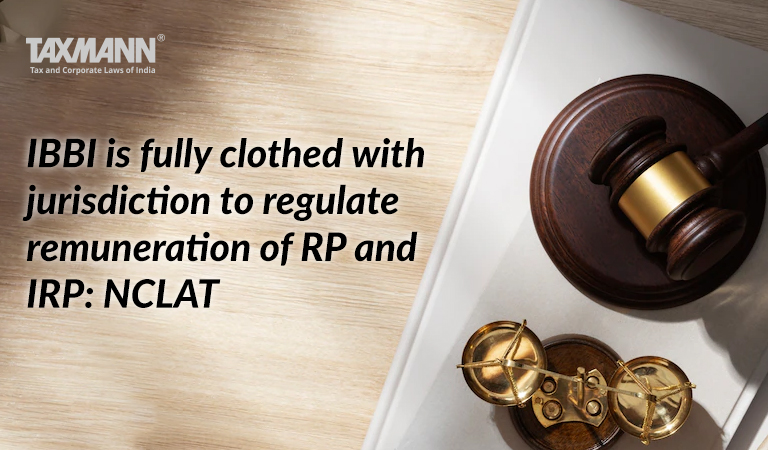IBBI is fully clothed with jurisdiction to regulate remuneration of RP and IRP: NCLAT
- News|Blog|Insolvency and Bankruptcy Code|
- 2 Min Read
- By Taxmann
- |
- Last Updated on 18 October, 2022

Case Details: Sumit Bansal v. Committee of Creditors of JP Engineers (P.) Ltd. - [2022] 142 taxmann.com 550 (NCLAT- New Delhi), dated: 15.10.2022
Judiciary and Counsel Details
-
- Justice Ashok Bhushan, Chairperson & V.P. Singh, Technical Member
- Abhishek Garg & Ayush Kuchhal, Advs. for the Appellant.
- PBA Srinivasan, Parth Tandon, PS Chandralekha, Ms Nikitha Ross, Ms Sneha Iyer & K.D. Sharma, Advs. for the Respondent.
Facts of the Case
In the instant case, the appellant filed an appeal against the order of the Adjudicating Authority (National Company Law Tribunal), New Delhi referring the matter to IBBI to decide the dispute on the fee to be paid to him as IRP.
The Appellant was appointed as the Interim Resolution Professional (IRP) by the Adjudicating Authority. In the first CoC meeting, he claimed that he should be paid Rs. 2 Lakhs per month. The matter of fee, however, could not be decided by the CoC and ultimately CoC ratified payment of Rs. 50,000/- per month only.
The Appellant’s claim that he worked up to 27-1-2021 as IRP. Later on, he was replaced by the Resolution Professional (Respondent No. 2.). The Appellant thereafter filed an Application before the Adjudicating Authority claiming the payment of fees @ Rs. 2 Lakh per month on which Application the Adjudicating Authority took a decision to refer the matter to the Insolvency and Bankruptcy Board of India (IBBI) to examine the claim of Ex-IRP.
The learned counsel for the Appellant challenged the order of the adjudicating authority on the basis that IBBI has no jurisdiction to decide the question of payment of fees of the Appellant. He further submitted that the Adjudicating Authority ought to have itself decided the matter regarding fee, rather than IBBI.
NCLAT Held
NCLAT held that the IBBI is clothed with Regulations making power under section 240 of the Code. Section 240(1) is to the following effect:-
“240. Power to make regulations.- (1) The Board may, by notification, make regulations consistent with this Code and the rules made thereunder, to carry out the provisions of this Code.”
IBBI is fully clothed with jurisdiction to regulate payment of remuneration of RP and IRP both by framing regulation or by issuing executive instructions till regulation are not framed can regulate the subject.
The issue of payment of fee to the IRP/RP occur very frequently which needs to be regulated by Regulating Authority who is clothed with the power. The mere fact that IBBI has been asked to submit its recommendations by the Adjudicating Authority, in the present case, NCLAT see no reason to question the jurisdiction of IBBI to submit a recommendation. Hence the appeal was dismissed.
List of Cases Reviewed
-
- Order passed by NCLT- New Delhi in I.A 5274 of 2021 order, dated 7-1-2022 (para 10) affirmed.
List of Cases Referred to
-
- Alok Kaushik v. Bhuvaneshwari Ramanthan [Civil Appeal No. 4065 of 2020, dated 15-3-2021] (para 6).
Disclaimer: The content/information published on the website is only for general information of the user and shall not be construed as legal advice. While the Taxmann has exercised reasonable efforts to ensure the veracity of information/content published, Taxmann shall be under no liability in any manner whatsoever for incorrect information, if any.

Taxmann Publications has a dedicated in-house Research & Editorial Team. This team consists of a team of Chartered Accountants, Company Secretaries, and Lawyers. This team works under the guidance and supervision of editor-in-chief Mr Rakesh Bhargava.
The Research and Editorial Team is responsible for developing reliable and accurate content for the readers. The team follows the six-sigma approach to achieve the benchmark of zero error in its publications and research platforms. The team ensures that the following publication guidelines are thoroughly followed while developing the content:
- The statutory material is obtained only from the authorized and reliable sources
- All the latest developments in the judicial and legislative fields are covered
- Prepare the analytical write-ups on current, controversial, and important issues to help the readers to understand the concept and its implications
- Every content published by Taxmann is complete, accurate and lucid
- All evidence-based statements are supported with proper reference to Section, Circular No., Notification No. or citations
- The golden rules of grammar, style and consistency are thoroughly followed
- Font and size that’s easy to read and remain consistent across all imprint and digital publications are applied



 CA | CS | CMA
CA | CS | CMA
